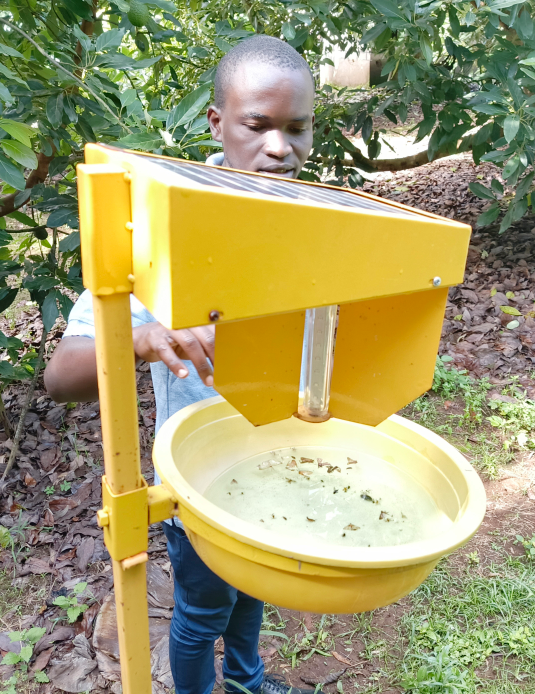
Avocado farmers in Meru county are turning to solar-powered innovation to tackle a pest threatening their livelihoods.
With support from local entrepreneurs and organisations, they are not only improving their harvests but also embracing sustainable farming practices. At the heart of this transformation is a simple yet powerful device: the solar trap.
Kinyua Nkanata, a tea and avocado farmer from Menwe village in Abogeta West ward, Imenti South, is at the forefront of a quiet agricultural revolution.
Avocado farming in the region has grown rapidly, driven largely by the high value of the Hass avocado variety. “It's now rivaling tea as a key cash crop,” he says. “More farmers are planting avocados because of the strong market and better returns.”
But with growth has come new challenges, the most destructive of which is the false codling moth (FCM), a quarantine pest that threatens export potential.
“If a single FCM is detected in a shipment to Europe or China, the entire container is returned,” Nkanata explains. “We can’t just spray pesticides because of strict residue limits in those markets.”
To tackle this problem, farmers are now using an innovative tool, the solar trap.
“FCM is mostly active from 5 pm to 11 pm,” Nkanata says. “The solar trap charges during the day and automatically lights up at night, emitting a strong blue light that attracts moths. They fall into a basin of soapy water and can’t escape.”
This tool has become both a control and monitoring device. “In the morning, we check how many moths were caught. It helps us assess infestation levels and determine if further action is needed.”
Nkanata has installed four solar traps on his two-acre avocado farm. “I scout my farm regularly. If I see white powder on a fruit, it’s likely an adult moth trying to lay eggs. If I spot brown exit spots, I know the larvae have already emerged. It’s crucial to act before the pest reaches the soil, where it completes its life cycle.”
In 2022, he lost over 2.2 tonnes of avocado due to FCM damage. “Before, my rejects were about 200–500kgs per season. But that year, the pest damage was massive.”
Despite the cost, Nkanata says the solar trap is far more economical than chemical control. “One unit costs about Sh13,000 and lasts five years, that’s around Sh2,000 per year. Compare that to pesticides, which cost me Sh6,500 every three months.”
Nkanata began avocado farming in 2009 with just half an acre. Today, he has over four acres under cultivation. “I used to grow food crops, but now 99 per cent of my land is for avocado and tea. Even if I get a small piece of land, I plant avocados. It has changed my life.”
As the chairman of the Abogeta West Avocado Cooperative Society, a group with more than 1,050 members, Nkanata has witnessed first-hand how collective bargaining and innovative farming techniques can transform lives.
“The cooperative was formed to help us negotiate better prices with exporters,” Nkanata says. “We’ve already acquired machinery and cold rooms for a packhouse. We're now sourcing generators and crates. Within a year, we expect to start exporting directly.”
Since 2017, the cooperative has been signing contracts with exporters who harvest fruit directly from member farms, paying farmers promptly through mobile money or bank transfers.
“The payment model is clear, farmers get 90 per cent of the value, harvesters (mostly local youth) earn five per cent, and the cooperative receives the remaining five per cent. It’s a system that creates jobs and empowers our community.”
Behind the technology is Mutuma Muriuki, Founder and CEO of EcoBistro Ltd, a company driving eco-friendly innovation for farmers.
“I started EcoBistro nearly three years ago with a background in agroecology and horticulture,” Muriuki says. “Our goal was to support organic farming and reduce dependence on harmful chemicals.”
The solar trap, a flagship product of EcoBistro, evolved from farmers using regular bulbs to attract moths. “We thought: what if we designed a better version. One that uses the right wavelength of light, runs on solar power and doesn’t harm pollinators like bees?”
Muriuki says they offer two trap models. The smaller version, Kifaru, uses soapy water and covers 1.5 to 2 acres, priced at Sh13,500. The larger model, which uses an electric grid, can protect up to five acres and costs about Sh40,000.
Understanding the financial limitations of smallholder farmers, EcoBistro introduced Lipa Pole Pole, a pay-as-you-go plan. “This way, farmers benefit from the trap even as they pay in installments,” he says.
A breakthrough came in 2023 when EcoBistro won a Sh1 million grant from Heifer International–Kenya. “With that, we improved the trap’s durability, added GPS for security, and expanded our reach. We’ve now supported over 200 farmers, including 50 in the pilot phase,” Muriuki adds.
In pest-prone areas like Chogoria and Tharaka Nithi, the traps have made a dramatic impact. “Some farmers have saved up to Sh100,000 per acre in pesticide costs. Others have boosted their yields by five tonnes and earned over Sh500,000 in a season,” he says.
Muriuki’s vision stretches beyond Kenya’s borders. “Africa is becoming the world’s food basket. We want to scale this innovation to Uganda, Tanzania, even South Africa, keeping it agroecological.”
He adds, “We're proving that young Africans can solve African problems. Heifer International believed in us, and now we’re helping farmers feed their communities sustainably.”











